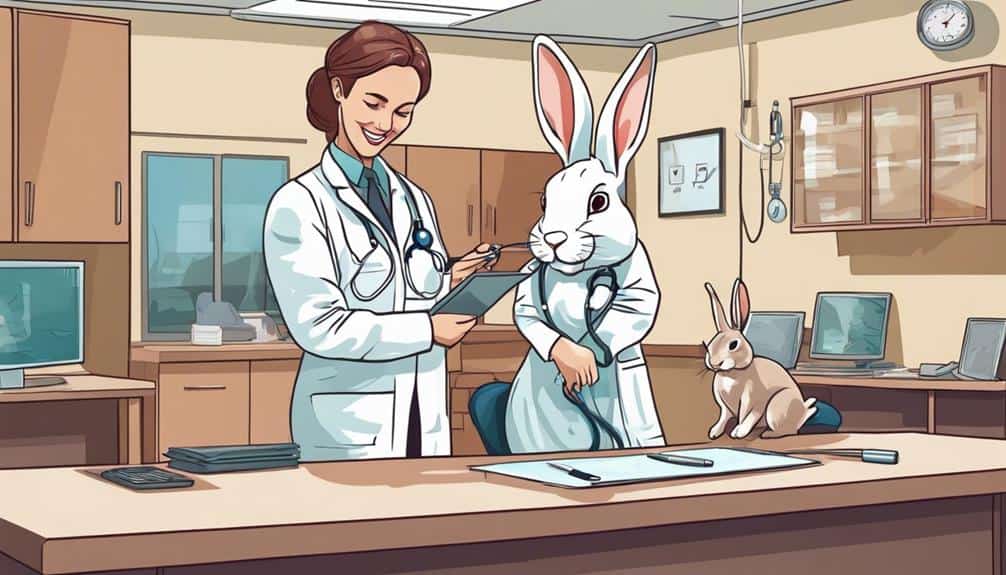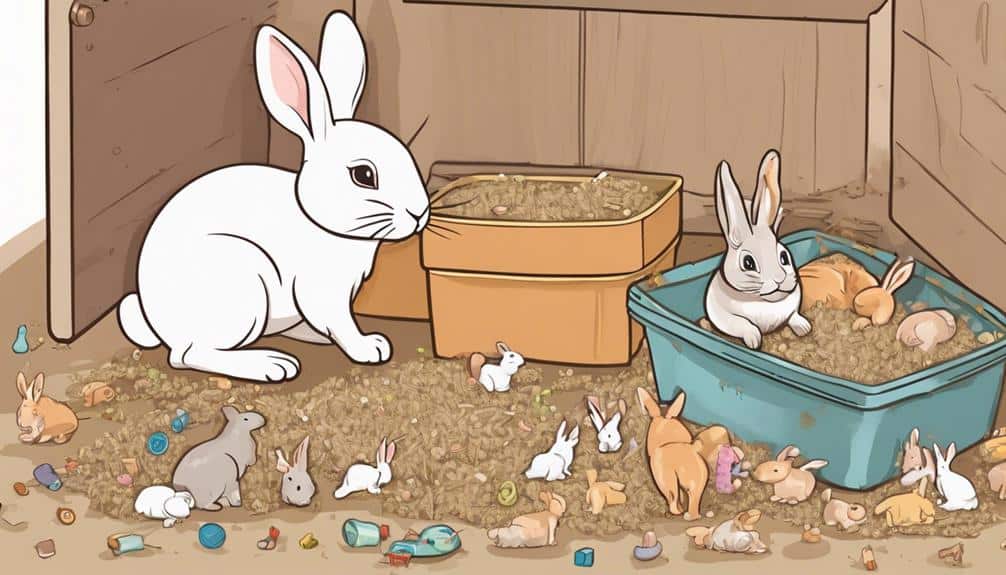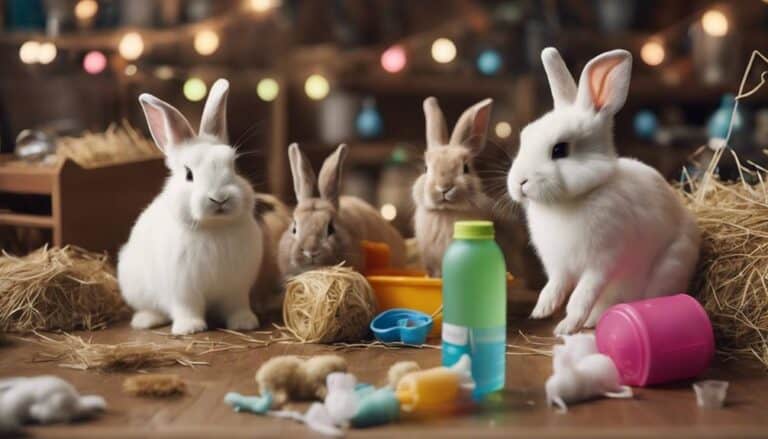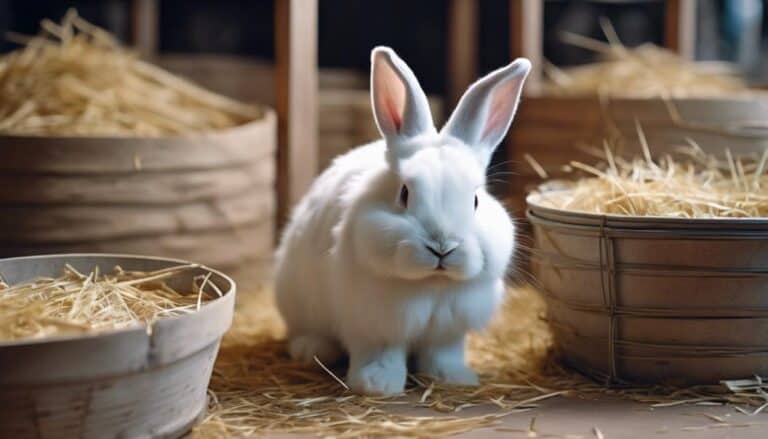When considering adding a bunny to your family, think of them as delicate flowers in need of proper nurturing. These charming creatures require much more than just a hutch and some carrots.
Ensuring their well-being involves a thorough exploration into their unique needs and behaviors. From diet and housing to socialization and health care, every aspect of bunny ownership demands attention.
But fear not, for the rewards of responsible bunny adoption are immeasurable. Stay tuned as we uncover the essential steps to providing a loving and fulfilling life for your bunny companion.
Contents
- 1 Key Takeaways
- 2 Bunny Adoption Considerations
- 3 Understanding Bunny Behavior
- 4 Bunny Housing Requirements
- 5 Bunny Diet and Nutrition
- 6 Bunny Health and Veterinary Care
- 7 Bunny Socialization and Enrichment
- 8 Bunny Training and Litter Box Tips
- 9 Bunny Long-Term Commitment
- 10 Frequently Asked Questions
- 11 Conclusion
Key Takeaways
- Choose a bunny at least 12 weeks old with verified health and gender.
- Provide a spacious, enriched habitat for mental stimulation and well-being.
- Commit to long-term care with proper diet, veterinary check-ups, and secure environment.
- Prioritize mental stimulation, playtime, and daily grooming for a happy, healthy bunny.
Bunny Adoption Considerations

When considering adopting a bunny, make sure you choose one that's at least 12 weeks old for a smoother adjustment process. A pet bunny needs to be of a good age to adapt well to its new environment. Younger bunnies, like those at 8 weeks old, might still need time to be properly weaned before adoption. Providing a small bunny with the right kind of care and attention during this important time is vital. Additionally, ensuring that your bunny is using a good litter will help in maintaining a clean and hygienic habitat for them.
Selecting a bunny that's at least 12 weeks old will help in their move to your home. This age is ideal as they're more independent and have developed certain behaviors. This also allows you to verify their health status and gender, preventing any future conflicts if you plan to house them with other rabbits. Remember, a well-adjusted bunny is a happy bunny, so make sure to provide them with the right environment and care they need.
Understanding Bunny Behavior
To understand bunny behavior, observe how they freeze or run when frightened, a response rooted in their prey instincts. Rabbits have a natural inclination to be cautious and alert, as in the wild, this behavior helps them avoid predators.
When handling rabbits, it's important to respect their boundaries and allow them to feel secure. Providing a shelter in their habitat offers rabbits a sense of security, enabling them to exhibit more relaxed behaviors. Most rabbits prefer to approach humans on their terms, so it's important to let them sniff and investigate you before attempting to handle them.
When it comes to picking up a rabbit, use both hands to support their hind end and chest for comfort. This method helps them feel secure and reduces the likelihood of them struggling or being frightened. By understanding and respecting bunny behavior, you can build a trusting relationship with your furry companion based on mutual understanding and care.
Bunny Housing Requirements

Observing bunny behavior closely prepares you to meet their housing requirements with care and understanding. When setting up a home for your rabbit, consider the following:
- Provide a Spacious Habitat: Your rabbit needs ample space to hop around, play, and explore. Mimicking their natural environment helps keep them active and happy.
- Avoid Wire Floors: Wire floors in cages can cause foot injuries and discomfort. Opt for a solid surface to guarantee your rabbit's well-being.
- Include Enrichment Toys and Hiding Spots: Multi-level cages with hiding spots and enrichment toys are essential for your rabbit's mental stimulation. These additions keep them engaged and prevent boredom.
Bunny Diet and Nutrition
When caring for your bunny, remember that a balanced diet is important for their well-being.
Feeding them high-quality hay, rabbit pellets, and fresh vegetables will guarantee they receive the essential nutrients they need.
Be cautious with treats like fruits and carrots, as they should only be given sparingly to maintain a healthy diet for your furry friend.
Balanced Bunny Diet
Ensuring a balanced diet for your bunny is important for their overall health and well-being. Here are three essential tips to help you provide the best nutrition for your furry friend:
- Prioritize Timothy hay: This high-fiber grass hay is essential for proper digestion and dental health.
- Incorporate fresh vegetables and leafy greens: Supplement your bunny's diet with a variety of fresh produce to guarantee a balanced nutrition intake.
- Limit pellets: While pellets can be part of their diet, they should be given in moderation to prevent obesity and promote a diverse diet.
Nutritious Food Choices
To guarantee excellent health and well-being for your bunny, selecting nutritious food choices is paramount in maintaining a balanced diet and proper nutrition.
Start by providing high-fiber grass hay, like Timothy hay, to promote proper digestion. Supplement their diet with leafy greens such as kale and spinach to offer essential vitamins and minerals. Ensure your bunny gets necessary nutrients by offering limited amounts of pellets specifically formulated for rabbits.
While fruits and vegetables can be delightful treats, remember to offer them in moderation to prevent digestive issues from excessive sugar or water content. For a tailored diet plan that meets your rabbit's individual needs, consult with a veterinarian to ensure a balanced diet that promotes the best health.
Bunny Health and Veterinary Care

Regular veterinary check-ups play an important role in safeguarding your bunny's health and well-being. Here are some key points to keep in mind for maintaining your rabbit's health:
- Regular Veterinary Check-ups: Just like us, rabbits need routine check-ups to make sure they're healthy. These visits are essential for catching any health issues early on and providing the necessary care.
- RHDV2 Vaccine**: Make sure your bunny receives the RHDV2 vaccine to protect against Rabbit Hemorrhagic Disease, a deadly illness that can affect rabbits. This vaccine is critical for your pet's well-being.
- Dental Health**: Rabbits' teeth grow continuously, so dental health is essential. Regular check-ups with a knowledgeable veterinarian can help prevent dental problems and make sure your bunny can eat and groom properly.
Bunny Socialization and Enrichment
As you focus on your bunny's well-being, remember that socialization and enrichment are key aspects of their happiness and overall health. Bunnies thrive on social interaction, so consider providing them with a bonded companion for mental stimulation and companionship.
Enrich their environment by incorporating toys, tunnels, and puzzle feeders to keep them engaged and prevent boredom. Rotate these toys regularly to maintain interest and offer opportunities for exploration and play.
Creating a safe and secure space for your bunnies to exercise, hop around, and express their natural behaviors is essential. Additionally, offering a variety of textures and materials, such as cardboard boxes, wooden chews, and grass mats, can keep your bunnies mentally and physically stimulated. These enriching elements not only entertain them but also contribute to their overall well-being. Remember, a happy and enriched bunny is a healthy bunny.
Bunny Training and Litter Box Tips

When training your bunny to use a litter box, position it in a corner where they naturally eliminate. This helps your bunny recognize the litter box as their designated bathroom spot.
Here are some tips to make the training process smoother:
- Choose the right litter box: Opt for a high-sided litter box to prevent litter from scattering around. Use rabbit-safe litter such as paper-based pellets or aspen shavings to assure your bunny's safety and health.
- Reward good behavior: Positive reinforcement is key. Whenever your bunny uses the litter box correctly, reward them with treats and praise. This encourages them to continue using the litter box.
- Stay consistent: Consistency is important in bunny training. Be patient and provide gentle guidance throughout the training process. With time and practice, your bunny will learn to consistently use the litter box, creating a cleaner and more comfortable environment for both of you.
Bunny Long-Term Commitment
Owning a bunny entails a profound and enduring commitment to their well-being and happiness over their potentially long lifespan of up to 15 years. Providing a secure habitat is important for a bunny's physical and mental health. Responsible ownership involves creating a safe environment, offering daily care, grooming, and ensuring mental stimulation through toys and playtime. Additionally, a proper diet, regular veterinary check-ups, and spaying/neutering are essential for your bunny's overall well-being.
Understanding the commitment required when adopting a bunny is important to establishing a lifelong bond and a happy relationship with your furry companion. It's important to remember that bunnies aren't low-maintenance pets and need dedicated care and attention. By being prepared for the long-term commitment of bunny ownership, you can ensure a fulfilling experience for both you and your beloved pet. Remember, your bunny's well-being depends on your responsible and loving care.
Frequently Asked Questions
What Do You Need Before Adopting a Bunny?
Before adopting a bunny, you need to prepare a suitable habitat and stock up on supplies like food dishes and chew toys. Research rabbit-safe bedding and create a safe play area. Remember, bunnies need long-term care and commitment.
What Is the Best Age to Adopt a Bunny?
The best age to adopt a bunny is ideally around 12 weeks. Waiting until this age guarantees they are well-weaned, healthy, and ready for the bonding process. It helps with their socialization, behavior, and adjustment to their new environment.
How Do You Take Care of an Adopted Rabbit?
Wondering how to take care of your adopted rabbit? Provide a balanced diet with hay and veggies, set up a spacious cage with hiding spots, groom regularly, exercise together, schedule health check-ups, and bond through gentle interactions for a happy bunny!
What Should First Time Bunny Owners Know?
As a first-time bunny owner, you should know about bunny behavior, dietary needs, exercise requirements, bonding tips, grooming basics, and health concerns. Educate yourself to provide a happy and healthy life for your new pet.
Conclusion
As you commence on the journey of adopting a bunny, remember that they aren't just pets, but cherished companions who rely on your love and care.
Like a delicate flower needing tender nurturing to bloom, bunnies require patience, understanding, and commitment to thrive.
By providing them with a safe, enriched environment and meeting their specific needs, you'll create a bond that will bring joy and fulfillment to both your life and theirs.






